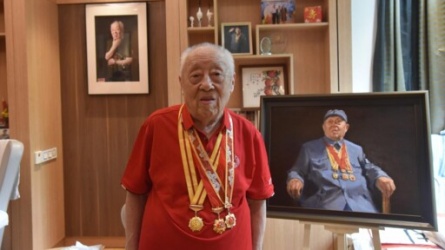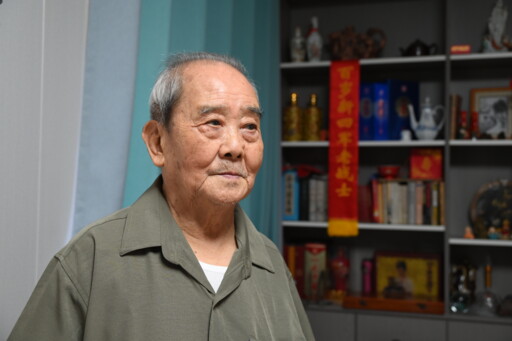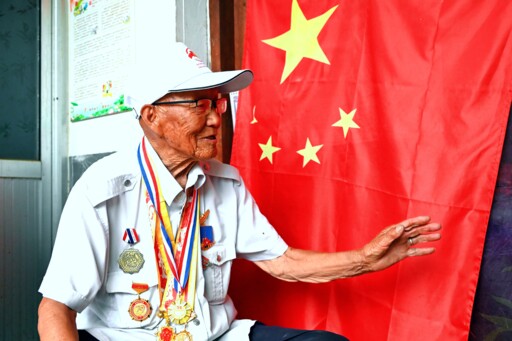


Undimmed glory: China’s War of Resistance veterans

Ding Weixi Photo: Wang Guanglu/CSST

Ni Xiaosong Photo: Wu Nan/CSST

Jia Lianzhen Photo: Zhang Jie/CSST
In the vast and turbulent course of the Chinese people’s War of Resistance Against Japanese Aggression, countless heroes rose to defend the nation’s dignity with their blood and their lives. The People’s Republic of China was built upon the sacrifices of innumerable martyrs. Each remembrance is not only a chapter of resistance written by veterans through their struggles, but also a vital part of the collective memory of the nation. Only by remembering history can we preserve peace.
Jia Lianzhen: Shears as weapons
In the rustic courtyard of war veteran Jia Lianzhen’s home, sunlight filters through the leaves, casting light across the chiseled wrinkles of his face. Beneath his clothes, an old bullet wound on his right arm—inflicted more than seventy years ago—still aches faintly, a “human weather station” whose pain reverberates like history itself on rainy days. Not long after the journalist’s visit, a heavy downpour indeed arrived, just as the old man had predicted.
In the summer of 1944, the sight of an Eighth Route Army soldier’s yellow cap ignited the passion of a 14-year-old boy. When he saw the village youths stride by in their yellow caps, Jia could not look away. His parents tried to frighten him: “If you wear a yellow cap like this, you’ll go to war and be killed.” Despite the warning he stole off in the dark of night to find the Eighth Route Army garrison in Qingkou Town, Lianyungang, around 15 km away. The officer there stroked the boy’s head and shook his own: “Kid, you can’t even carry a rifle!” Yet the stubborn teenager sat on the threshold and refused to leave. Three days later, a shining pair of shears was placed in his hand—a special “weapon” that launched nine years of fiery youth. Disguised as a barber, he carried intelligence through streets and alleys, silently shouldering the perilous duty of a wartime courier.
Death always shadowed the messenger’s path. Once, two Japanese soldiers pursued him like hounds. As he sprinted desperately across the fields, he dropped his barber’s tools one by one—but clutched the life-or-death message tightly to his chest. Gunfire cracked behind him, and only when a comrade ambushed the pursuers twenty meters away did he collapse to the ground—still holding the letter safe and intact.
“The bullets sounded like a fierce wind, whizzing past…” Jia recalled. He narrowed his eyes recalling night marches: Soldiers tied themselves together with rope at the waist; some fell asleep while walking—the taut rope keeping the somnambulant column intact. When asked why he chose the Eighth Route Army, Jia’s eyes lit up. He had seen Kuomintang soldiers steal and sell villagers’ property, and the Communist troops kept strict discipline: They would rather eat feed meant for pigs than take from the people. When billeted in villagers’ homes, they abided by the “Three Don’ts”—don’t leave until the yard is swept, the water jar filled, and any damage compensated.
During the Menglianggu Campaign in 1947, Jia was gravely injured by shell fragments. He was sheltered by the head of the Women’s Rescue Association in Junan County, Shandong Province. This family, which already had two sons, claimed Jia as their eldest to protect him. While recuperating from his wounds, he would gaze at the sunflower heads hanging from the rafters, and the “mother” would knowingly roast seeds for him. Their golden kernels became the warmest taste in his memory. Even after leaving that foster family to rejoin the army and march south, he continued writing letters to his “mother”—an affection forged in war that endured across distance.
After nine years of service, the pair of shears that had once saved Jia’s life again became a means of livelihood. Even into his eighties, he carried his toolbox to the marketplace. On the wall of his living room hangs a frame of old photographs, one among them in particular filling the old man with pride—his grandchild dressed in a police uniform.
Ni Xiaosong: Lifelong remembrance of fallen comrades
Ni Xiaosong, formerly Ni Shousong, was born in August 1926 to a poor farming family in Yanggeng Village, Wuwei County, Wuhu City, Anhui Province. At the age of 13 or 14, he began running errands and delivering messages for the revolution, following his uncle who had joined the New Fourth Army. In March 1941, under his uncle’s influence and guidance, he formally joined the reorganized Seventh Division of the New Fourth Army. “As soldiers, we not only organized the common people, recruited troops, and fought the enemy, but also had to cultivate wasteland and grow our own food. Wherever the Japanese army went, they plundered, burned, and slaughtered, leaving us unable to farm,” Ni recalled.
In 1943, at just 17 years old, Ni was appointed by the organization as head of Bajiaomiao Township (now Bajiao Village) in Shenxiang Town, Hexian County, under the alias Li Ming. His duties included expanding the army, sabotaging puppet troops’ roads, managing arsenals and communications facilities, and ensuring the safety of anti-Japanese bases.
In July 1943, having infiltrated the puppet army’s Tangguo Town headquarters, Ni received an urgent message from an underground intelligence agent: At dawn the next day, Liu Ziqing, commander of the local puppet forces, would lead several thousand Japanese and puppet troops in a surprise attack on the training class being held by the New Fourth Army’s Seventh Division in Tanqiao Houbao Village, as well as nearby guerrilla units and the Southern Anhui Detachment headquarters. Ni rushed to first to inform the training class, then raced toward the Southern Anhui Detachment headquarters, over ten kilometers away. To ensure the safe delivery of the intelligence, he disguised himself as a cowherd. When stopped and questioned by the Japanese and puppet soldiers along the way, he hid the written message inside a pile of cow dung by the roadside, thereby evading inspection and preventing what could have been a major loss of lives.
During the war, the Japanese invaders’ “mopping-up” operations left an indelible scar on Ni’s memory. “When the Japanese invaded Shujiadian Village to carry out a ‘mopping-up’ operation, they tied up several key anti-Japanese fighters and butchered them with bayonets. The Japanese didn’t kill with a single blow—they cut people up with knives. It was unbearably cruel.” He continued, “On the Lantern Festival of 1941, several villages around the former Wuwei County were completely burned to the ground, their inhabitants slaughtered.” Recalling those agonizing days, Ni broke down in tears, covering his face as he choked on his words.
In 1945, after 14 years of resistance, China achieved victory. Ni continued to fight in campaigns such as Laiwu (1947), Menglianggu (1947), Nianzhuang (1948), Suiqi (1948), and Huaihai (1948-1949). During the Suiqi Campaign, Ni served as the medical officer of the 49th Regiment, 17th Division, Sixth Column of the East China Field Army. At one point, unable to carry a wounded comrade on his back, Ni stripped off his own clothes, spread them on the ground, laid the soldier on top, and dragged him toward a trench. Just as he reached one, a shell exploded, injuring his spine and leaving him unconscious for three days.
After the battle, when the commanding officer came to visit the wounded, he said to Ni: “Comrade Shousong, let me give you a new name. Too many of you tiger-year soldiers have fallen—at least nine of them. You’re the only one left. From now on, you’ll be known as ‘Xiaosong’ (虓嵩). ‘Xiao’ (虓) refers to nine tigers sacrificed, and also symbolizes bravery; ‘Song’ (嵩) commemorates your comrades, who are now at rest on this high ridge.”
From then on, Ni bore the name “Xiaosong” in lifelong remembrance of his fallen comrades.
Ding Weixi: Healing in war, serving in peace
Born in 1925 in Siyang, Jiangsu Province, Ding Weixi experienced the devastation of war early in life. In 1939, Japanese bombing reduced his hometown to ruins, forcing his family to flee to the countryside. In 1942, upon learning that the New Fourth Army had set up schools in the border region of northern Anhui and Jiangsu, he and several classmates set out to study. At that time, Huaibei Middle School operated under extremely harsh conditions: Classes were held in the forest, students used their backpacks as stools, and leaned against trees to listen to lectures. Yet it was in precisely such hardship that Ding’s perseverance and tenacity were forged. He later transferred to the Medical School of the New Fourth Army’s Fourth Division, where he systematically studied emergency medicine and nursing. After graduation, he was assigned to the Fourth Rear Hospital, where he participated in major campaigns including Subei (1946), Laiwu (1947), Menglianggu (1947), Huaihai (1948-1949), and the Crossing-the-Yangtze Campaign (1949).
Time after time on the battlefield, Ding and his comrades risked their lives to rescue the wounded, racing against time. During the Subei Campaign, a battalion commander with a severe head injury was rushed to the rear. Thanks to timely intervention, Ding and his team managed to save his life. In the Huaihai Campaign, the local hospital was overwhelmed with casualties. Ding recalled that he and his comrades “went nearly three days and nights without closing our eyes,” faithfully holding their posts.
“As a military doctor, the responsibility was immense,” Ding said with deep emotion as he showed reporters old photographs. “On the battlefield, medical personnel were in urgent demand. Every campaign meant countless people were bleeding and sacrificing their lives. As medical staff, it was our duty to shoulder the responsibility—evacuating the severely wounded in time and treating the lightly wounded as quickly as possible.”
After the founding of the People’s Republic of China, Ding shifted to the field of public health, dedicating decades to the prevention and treatment of schistosomiasis. At the time, the disease was rampant in Jiangsu Province. Ding and his colleagues worked on the frontlines, promoting awareness and disseminating effective treatments. Their tireless efforts helped bring the epidemic under control, dramatically reducing cases. For these contributions, Ding and his team received the Jiangsu Provincial Lifetime Achievement Award in Disease Prevention and Control.
Even in retirement, Ding’s bond with his alma mater—Tongji Medical College of Huazhong University of Science and Technology—remains strong. On April 23, 2025, he donated 100,000 yuan to the college to support its “Public Health Elite” training program. “Though the sum is modest, it reflects my deep affection for my alma mater. More importantly, I hope it will inspire more students to study diligently and dedicate themselves to building our country,” he said.
Now at the age of one hundred, Ding remains vigorous and spirited. His retirement is rich and fulfilling: He continues to practice calligraphy and follows political and national affairs with keen interest. To him, today’s life is a treasure hard won. “New China did not come easily,” he said. “We must never forget history, nor the heroic sacrifices of the martyrs. Only by remembering history can we better create the future.”
This article was written with input from Liu Yue, Wang Guanglu, Wu Nan, and Zhang Qingli.
Copyright©2023 CSSN All Rights Reserved